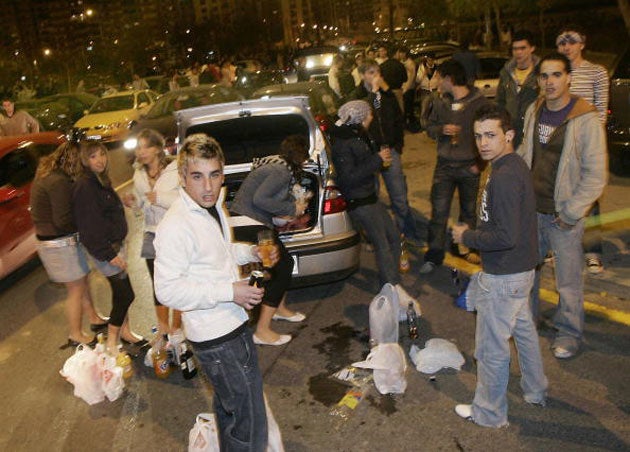Spain accused of exporting binge drinkers to Portugal

The little resort town of Tavira, in Portugal's Algarve, is fed up with the hordes of noisy foreigners who party all night on the beach, drinking themselves senseless and then trashing sunshades, deckchairs and life-saving equipment.
So disgusted have the local residents become with the violent antics of these invaders that this summer the town's mayor, Macario Correia, is calling on the government in Lisbon to change the law so as to ban binge-drinking in public places.
Those responsible for this seaside mayhem are not drunken Britons, nor are they other pallid northern Europeans. They are from Spain – Portugal's neighbour 12 miles up the road. Mr Correia said: "Thousands of young Spaniards come here at night, laden with huge containers of vodka, whisky and beers, get drunk and go on the rampage, committing all sorts of acts of vandalism."
He added that young Spanish revellers cause around €200,000 (£160,000) of damage a year in Tavira. "When it gets cold at night, they go so far as to make bonfires" from items of public property they have destroyed on the beach, he said.
The problem has grown worse since the local government in Spain's Andalusia region, which borders on Portugal, passed a new law in 2006 on the consumption of alcohol in public places.
The aim was to stamp out the vogue for botellon or "big bottle" gatherings – alcoholic binges in which young Spaniards mobilise in their thousands to drink strong spirits in the open air through the balmy summer nights. Other regions of Spain followed suit with similar legislation, which had the effect of shunting the phenomenon across the border into Portugal.
Last week Mr Correia wrote to the Portuguese Interior Minister, Rui Pereira, asking for a change in Portuguese law. "I asked for a similar law to the one in Andalusia," the mayor said.
But Portugal is reluctant to take measures that might offend its prosperous neighbour, whose tourists – second in number only to visiting Britons – greatly boost the Algarve's economy.
Spain and Portugal share not just a long border but centuries of mutual suspicion and hostility. Despite their proximity, they are utterly different in temperament. The soft-spoken Portuguese wince at the high-decibel shrieks of visiting Spaniards.
But Portugal has had to bite back objections, as Spain's influence has moved deeper into its smaller neighbour's economy. Antonio Pina, chairman of the Algarve region's tourism authority, said : "I see the mayor's problem, but I would never make such a direct accusation against a particular nation ... especially from countries where we mount costly publicity campaigns urging them to visit."
But Mr Correia doesn't mince his words: "Every other day our municipal cleaners have to clear up debris left by Spaniards in an alcoholic coma. I worry about the cultural education of these youngsters, who can't enjoy themselves without getting out of their heads with drink.
"It's an affront to holidaymakers who come to rest and enjoy the beach. When around 2,000 Spaniards hit our beach at weekends, it's impossible for the town's two policemen on night duty to control them."
He wants Spanish police to carry out more rigorous checks, especially at weekends, on drunken drivers along the busy coast road that crosses the border.
By contrast, British visitors, for whom the Algarve's small coastal towns are popular holiday destinations, behave well, Mr Correia says. But he adds: "We don't receive many Britons in Tavira. Mostly Spaniards."
Join our commenting forum
Join thought-provoking conversations, follow other Independent readers and see their replies
Comments
Bookmark popover
Removed from bookmarks